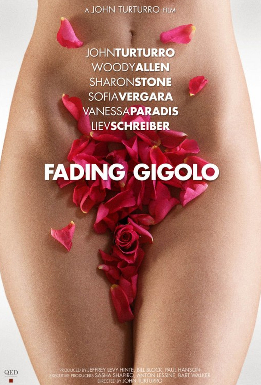At first glance, the premise of Fading Gigolo might sound like an Adam Sandler movie: an entrepreneurial old man starts pimping out his friend Fioravante to women around New York City for cash. Of course, once he meets a special client, emotions get in the way of sex! Wazzzzzzzaaaaapppppppp!!!!
But writer/director/star John Turturro's humble charm expunges the source material of any whiff of the locker room. The film (literally film, in the case of the 8mm opening credit sequence) is more the stuff of a high modern novel than a Deuce Bigalow fan fiction.
Woody Allen, who mentored Turturro through the development process, makes a rare on-camera appearance as the bookstore-owner cum pimp Murray. He plays himself, without much effort. The witticisms and freeform banter flow like milk and honey.
John Turturro puts his stamp on the film through the incredible moments of stillness he achieves. They are achievements. His long affinity for Japanese films wears its Sunday best; he and Vanessa Paradis exist in scenes together with the stillness of a samurai. His approach makes the smallest of choices stand out like the blade of a katana flashing towards your flesh.
As much as Fading Gigolo is an ode to Woody Allen, it is an ode to a bygone New York City. Maybe that's redundant. But the sense of nostalgia is clear: old mom and pop shops, neighborly conversations, thriving ethnic communities. It's clearly a personal matter for the lifelong New Yorkers behind the project.
Still, in light of the subject matter it is hard not to read recent allegations about Allen's personal life into the movie. Seeing Woody Allen talking about sex on camera creates a certain sort of queasiness. One hopes to see a moratorium on this in future.
Sofia Vergara is beautiful. She also makes a couple of wonderful choices that hint at a wider range than the public has come to expect from her. More! More!
There's some flimsiness to the way the movie deals with the Chasidic community, however. To presume that Avigal (Paradis) is in need of some sort of liberation from her community is a bit arrogant. The press notes around the film assure us that years of research were spent on the community. The end result, like the rest of the movie, is an eclectic mix of poignant portrait"¦and caricature.
John Turturro loves cinema. He is a good director. More! More!

